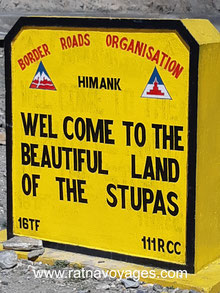CHEMDE MONASTERY, SAKTI VALLEY, LADAKH

|
NAME/NOM/ NAME/NOME |
CHEMDE GOMPA | |
|
|
||
|
LOCATION/LIEU/ ORT/LUOGO |
Chemde Village, 44Km from Leh | |
|
LINEAGE/TRADITION/ SCHULE/ORDINE |
Drukpa | |
|
|
||
|
FOUNDED/FONDÉ/ GEGRÜNDET/FONDATO |
1664 | |
|
|
||
|
FOUNDER/FONDATEUR/ GRÜNDER/FONDATORE |
Tagsang Raschen supported by King Sengge Namgyal | |
|
|
||
|
PROTECTOR/PROTECTEUR/ SCHIRMHERR/PROTETTORE |
||
|
SPIRITUAL HEAD/ MAÎTRE SPIRITUEL/ GEISTIGES OBERHAUPT/ CAPO SPIRITUALE |
||
|
BRANCH/AFFILIÉ/ ZWEIG/AFFILIATO |
||
| FESTIVAL | Wanchuk | |
| FESTIVAL 2024 | November 28 - 29, 2024 |
Chemde Monastery - Foundation and Establishment
Chemde Monastery, also spelled Chemrey or Chemrey, is a Buddhist monastery located in the Ladakh region of Jammu and Kashmir, India. Here is a detailed history of Chemde Monastery
Chemde Monastery was founded in the early 17th century by the Lama Tagsang Raschen, a disciple of the famed Tibetan Buddhist scholar and saint, Stag-tsang-ras-pa. The monastery is affiliated with the Drugpa (or Drukpa) Kagyu school of Tibetan Buddhism, which traces its lineage back to the great Indian yogi and scholar Naropa.
Chemde Monastery - Spiritual Lineage
As a Kagyu monastery, Chemde follows the teachings of the Kagyu school, known for its emphasis on meditation and direct experience of enlightenment. The Kagyu tradition is one of the major schools of Tibetan Buddhism and is often associated with the practice of Mahamudra, a profound meditation technique.
Chemde Monastery - Geographical Location
Chemde Monastery is strategically located on a hilltop, offering panoramic views of the surrounding mountains and valleys. Its geographical location, like many other monasteries in Ladakh, reflects the traditional Tibetan Buddhist approach of choosing serene and elevated sites for spiritual practices.
Chemde Monastery - Architectural Features
The monastery boasts traditional Tibetan architecture with white-washed walls, vividly painted wooden window frames, and a central courtyard. The main assembly hall, housing statues and thangkas of Buddhist deities, serves as the focal point for religious activities.
Chemde Monastery - Religious Practices
Chemde Monastery serves as a center for meditation, religious ceremonies, and Buddhist teachings. The resident monks, following the Kagyu tradition, engage in rigorous meditation practices and study Buddhist philosophy.
Chemde Monastery - Cultural Significance
The monastery, like many others in Ladakh, plays a crucial role in preserving the cultural and religious heritage of the region. It hosts various festivals and rituals that attract both local devotees and tourists, providing an opportunity to experience Ladakhi Buddhist culture.
Chemde Monastery - Educational Institution
Chemde Monastery serves as an educational institution where young monks receive training in Buddhist scriptures, philosophy, and ritual practices. The educational system within the monastery is designed to pass on the rich Buddhist traditions from one generation to the next.
Chemde Monastery - Tourist Attraction
In recent years, Chemde Monastery has become a popular tourist attraction, drawing visitors with its spiritual ambiance, architectural beauty, and cultural richness. Travelers often visit as part of a broader tour of Ladakh's monastic sites.
Chemde Monastery - Accessibility
Situated in the eastern part of Ladakh, Chemde Monastery is accessible by road, and its location makes it a stop for those exploring the monastic circuit in the region.
In conclusion, Chemde Monastery stands as a testament to Ladakh's profound Buddhist heritage, contributing to the spiritual, cultural, and educational landscape of the region. Its historical significance, combined with its architectural beauty, makes it a noteworthy destination for those seeking to explore the Buddhist legacy of Ladakh.






























